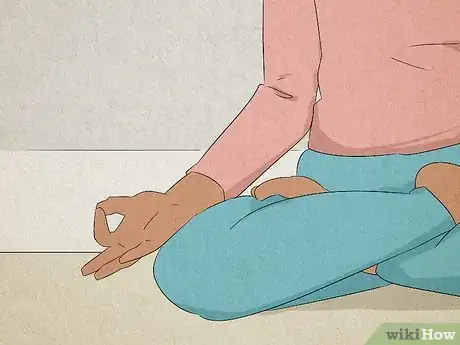This article was co-authored by Donna Novak, Psy.D. Dr. Donna Novak is a Licensed Clinical Psychologist based in Simi Valley, California. With over ten years of experience, Dr. Novak specializes in treating anxiety and relationship and sex concerns. She holds a BA in Psychology from the University of California, Los Angeles (UCLA) and a doctoral degree (Psy.D) in Clinical Psychology from Alliant International University-Los Angeles. Dr. Novak uses a differentiation model in treatment that focuses on personal growth by increasing self-awareness, personal motivation, and confidence.
There are 9 references cited in this article, which can be found at the bottom of the page.
This article has been viewed 42,518 times.
Complaining is a common pastime for many people. Some people even bond over their mutual complaints about restaurants, politics, the weather, and even their own lives. However addictive it may be, complaining can actually create a cycle of negativity. Learn how to control the amount of complaining you do and use your voice for positive statements.
Steps
Changing Your Reactions
-
1Learn assertiveness. Many people complain as a passive-aggressive tactic when they don’t know how to ask for what they want. You might complain about doing certain activities or favors simply because you do not know how to say “no.” The first step in becoming more assertive is getting in touch with your own needs/wants and then being able to say no to things that do not align with them.
- Start small with assertiveness. Express how you feel about an invitation that you need to decline, such as “Thanks for the invite to the birthday party, but I won’t be able to attend.” Use similar tactics for bigger issues as they come up.
- Guilt also plays a huge role in not being able to say no. Let go of the guilt because realistically, it is impossible to say yes to every invitation or to every project someone asks you to help with. You have just as much right as anyone else does to decide what things you can do and what things you cannot. An honest reply should not come with guilt on your part.
-
2Strive to adapt to change. While change is uncomfortable at times, it is important to understand that change is a constant part of life.
- Anxiety can play a role in not wanting to deal with change, but learning to recognize those feelings as being natural and also temporary can help in working past them. Be willing to ask for clarification if you need to about to how things are going to change and request support as needed.
- If you do need to speak up about an issue relating to some sort of change, find positive ways to assert yourself instead of complaining. Offer solutions or suggestions for changes instead of pointing out the worst thing that could happen in the situation.
Advertisement -
3Own your own mistakes. Accept responsibility for your part in the way things are. Complaining can stem from not being ready to take ownership of your own role in either the problem or the solution.[1]
- If you are unhappy in your current environment, own your part in getting to where you are. This can be done by acknowledging your role just as you acknowledge others' roles. Also realize that you are the only person with the power and responsibility to improve any aspect of your life if you are unhappy with it.
-
4Offer constructive criticism instead. Unlike complaining, constructive criticism offers solutions or information to help the problem-solving process instead of just pointing out the negative in the situation. Constructive criticism generally does not contain the negative undertones or blame that complaining or nagging does. It is simply a way to stand up for yourself in naming and then fixing the problem.[2]
- For example, if you have become frustrated at work by the way a co-worker performs a certain task, you could complain about it by telling the co-worker that their work is poor or by making a big deal about having to re-do whatever project .
- Or, you could say “Hi, Joey, your last project could use some improvements. Is there any additional training you require to get up to par on [given task]? What can we do to make sure the project will get done correctly the first time?”
Modifying Your Perspective
-
1Practice gratitude. Avoid getting stuck in the rut of complaining about things you take for granted. Take time each day to point out a few things that you are happy about in your life.[3]
- It may seem like everyone naturally complains about returning to work on Monday morning. Instead, learn to value having a job to go to each week. Not everyone is able to work or, if they are, they may be unable to find work that meets their financial needs or in their chosen field. Complaining about work just makes the job seem even worse than it really is and more of a burden than it needs to be.
- Complaining about family often again seems like something everyone does. It may seem natural to complain about your teenager, but be grateful you are able to meet your family’s basic needs so your biggest worry is how busy they keep you running from event to event.
-
2Stop judging others—and yourself. Complaining not only judges others harshly but it also often sets you up to be your own worst critic. Sometimes, people judge others merely because their way of doing things is different.[4]
- Learn the difference between someone doing something different than your preferred way and doing something “wrong.” Someone may take a different route to get things done. But, if the outcome still meets the goal, that’s all that matters.
- Appreciate the value of diversity instead of focusing on differences. You may find yourself actually growing and learning from those who are different from you, if you open yourself up to different views of things around you.
-
3Look for the lesson in unfortunate situations. Focus on the here and now, and forgive others so you can learn from what has happened instead of getting stuck in the fallout from the bad event.[5]
- Give yourself time to vent, get angry or feel however you need to in the moment. Then let those feelings go and free yourself to move forward. It is a mistake to feel the need to hide feelings because you never get to deal with them and then move on.
- Know that each mistake is a chance to change how you act in the future, and this is a huge part of learning. Think of all the things you have learned in the past just by encountering and gaining knowledge after a mistake.
-
4Recognize that the world is imperfect. Allow yourself to be imperfect and recognize the fact that those around you also will be imperfect at times. No matter how well-prepared you are for any life event, things may not go the way you expect or plan. Being prepared for this may lead you to become more flexible to find solutions in the moment instead of being overwhelmed by something going wrong.
- With major events like a wedding, birthday or even school activities, you can often put undue pressure on yourself and others to make everything perfect. Learn to focus on the most important things and recognize that many small details will go unnoticed by the average person.
Building a Healthy Mindset
-
1Learn mindfulness. Mindfulness uses concentration and acceptance to maintain presence in the moment.[6] Mindfulness is a great way to overcome complaining because it allows you to accept the present moment and all that comes with it.
- Practice mindfulness by sitting quietly in a comfortable chair or on a cushion. Breathe deeply—in through your nose and out through your mouth. Focus on your breath, clearing your mind of all other thoughts. When you notice your mind wandering, simply bring your attention back to your breath without judgment.[7]
- Try to identify the most common complaints you repeat in your mind. That way, you'll be able to become aware when it's happening. Then, replace those thoughts with something else you can say to yourself instead—you might even write it down.[8]
-
2Exercise to boost your mood. Self-care and taking steps to make sure you are in your best physical shape can go a long way in changing your outlook.[9]
- Instead of complaining, use the extra energy you would waste on the negative to squeeze in a good workout. Use a long walk as a break from stress at home or spend 30 minutes doing cardio to sweat out the frustration you might otherwise complain about.
- Using physical activity to give your body a boost also will help with your mood as moving your body releases feel-good chemicals called endorphins. Being in poor health or poor physical fitness can be yet another thing to complain about. Exercise is a constructive way to improve your physical and mental well-being.
-
3Practice relaxation techniques to alleviate negative feelings. Be mindful of your triggers and which audiences tend to bring out the most complaints, and then work to find ways to relax instead of reacting. Great ways to relax include deep breathing, meditation, yoga, progressive muscle relaxation, or even going for a nature walk.[10]
- If you are able to make yourself aware of some of your major triggers, you can prepare yourself with positive affirmations or even role play different ways to respond to the triggers. In order for a trigger to work it depends on a knee jerk reaction from you; learn to take away that power by relaxing or otherwise preparing yourself.
-
4Keep moving forward. Embrace the opportunity and power to make changes in your day to day life. Each day is a chance to do better than before. Start with small steps to move forward and build on what you have learned from past mistakes.[11]
- Embrace the chance to experiment and mix things up a bit. Open yourself up to try new things even if you are not sure if they will be successful. Strive to enjoy the experience instead of driving only for success.
Expert Q&A
Did you know you can get expert answers for this article?
Unlock expert answers by supporting wikiHow
-
QuestionHow do I stop compulsive complaining?
 Donna Novak, Psy.DDr. Donna Novak is a Licensed Clinical Psychologist based in Simi Valley, California. With over ten years of experience, Dr. Novak specializes in treating anxiety and relationship and sex concerns. She holds a BA in Psychology from the University of California, Los Angeles (UCLA) and a doctoral degree (Psy.D) in Clinical Psychology from Alliant International University-Los Angeles. Dr. Novak uses a differentiation model in treatment that focuses on personal growth by increasing self-awareness, personal motivation, and confidence.
Donna Novak, Psy.DDr. Donna Novak is a Licensed Clinical Psychologist based in Simi Valley, California. With over ten years of experience, Dr. Novak specializes in treating anxiety and relationship and sex concerns. She holds a BA in Psychology from the University of California, Los Angeles (UCLA) and a doctoral degree (Psy.D) in Clinical Psychology from Alliant International University-Los Angeles. Dr. Novak uses a differentiation model in treatment that focuses on personal growth by increasing self-awareness, personal motivation, and confidence.
Licensed Clinical Psychologist
-
QuestionHow do I stop being a chronic complainer?
 Donna Novak, Psy.DDr. Donna Novak is a Licensed Clinical Psychologist based in Simi Valley, California. With over ten years of experience, Dr. Novak specializes in treating anxiety and relationship and sex concerns. She holds a BA in Psychology from the University of California, Los Angeles (UCLA) and a doctoral degree (Psy.D) in Clinical Psychology from Alliant International University-Los Angeles. Dr. Novak uses a differentiation model in treatment that focuses on personal growth by increasing self-awareness, personal motivation, and confidence.
Donna Novak, Psy.DDr. Donna Novak is a Licensed Clinical Psychologist based in Simi Valley, California. With over ten years of experience, Dr. Novak specializes in treating anxiety and relationship and sex concerns. She holds a BA in Psychology from the University of California, Los Angeles (UCLA) and a doctoral degree (Psy.D) in Clinical Psychology from Alliant International University-Los Angeles. Dr. Novak uses a differentiation model in treatment that focuses on personal growth by increasing self-awareness, personal motivation, and confidence.
Licensed Clinical Psychologist Awareness is really key when trying to stop this habit. Identify the common complaints that you repeat in your mind so you can be aware when it's happening. Also, have some alternative things you will say to yourself instead. Make sure to write those down and have it easily accessible for you to look at.
Awareness is really key when trying to stop this habit. Identify the common complaints that you repeat in your mind so you can be aware when it's happening. Also, have some alternative things you will say to yourself instead. Make sure to write those down and have it easily accessible for you to look at.
References
- ↑ http://www.stevepavlina.com/blog/2007/08/how-to-stop-complaining/
- ↑ http://www.becomingminimalist.com/complain-less/
- ↑ http://www.webmd.com/women/features/how-i-stopped-complaining-week
- ↑ http://www.lifehack.org/articles/communication/7-effective-ways-stop-complaining.html
- ↑ http://psychcentral.com/blog/archives/2014/07/22/learning-to-let-go-of-past-hurts-5-ways-to-move-on/
- ↑ http://www.helpguide.org/harvard/benefits-of-mindfulness.htm
- ↑ https://www.psychologytoday.com/blog/the-courage-be-present/201001/how-practice-mindfulness-meditation
- ↑ Donna Novak, Psy.D. Licensed Clinical Psychologist. Expert Interview. 9 December 2020.
- ↑ http://tinybuddha.com/blog/10-ways-to-complain-less-and-be-happier/
About This Article
If you want to complain less, try focusing on appreciating the things in your life that you might take for granted. For example, instead of complaining about returning to work on Monday morning, remind yourself to be grateful that you have a job and an income. Just having a positive mindset will actually make these things seem like much less of a burden. When you are frustrated by another person’s actions, offer constructive criticism to help solve the problem, instead of simply pointing it out. For example, if your co-worker is performing a task poorly, focus on giving them advice for improving their work, rather than nagging or scolding them for their mistakes. For more tips from our co-author, like how to stop judging other people and yourself, keep reading!








































































